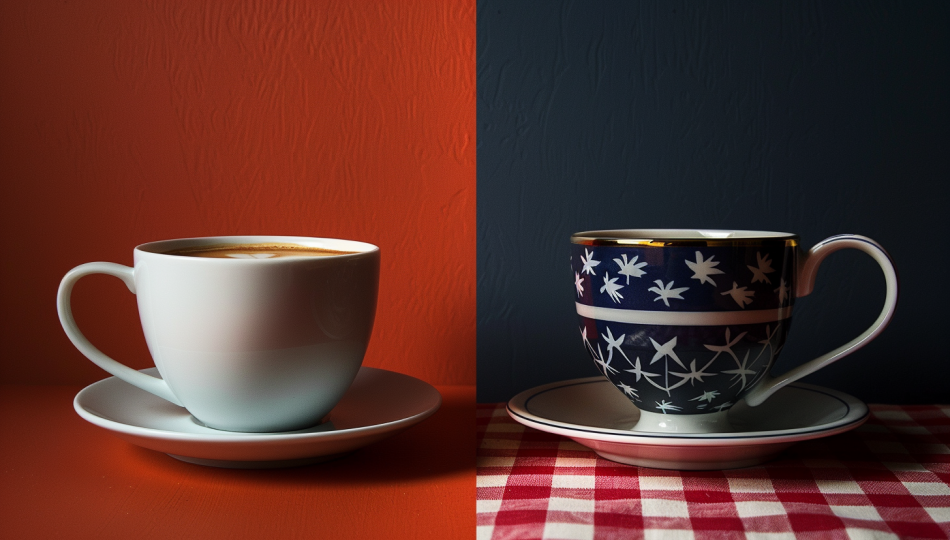The Battle of Brews: Do Poles drink coffee or tea?

Editor

related articles
related offers
Poles are Team Tea, or the beginning of a beautiful friendship…
The tale of coffee and tea in Poland is as rich and layered as a perfectly brewed cup.
The first mentions of tea appeared in Poland in the 17th century, courtesy of merchants and travelers who brought this exotic beverage from the East. It quickly became a staple among the Polish nobility, with elaborate tea sets becoming a status symbol. Allegedly, King Jan Kazimierz asked Marie Luise, his French wife, for some tea brewing tips.
Coffee: The Dark Horse enters the race
Coffee, on the other hand, made its grand entrance a little later, in the 18th century. It was an instant hit in the burgeoning café culture of Warsaw and Kraków, where intellectuals and artists gathered to sip and converse.
Fast forward to the 21st century, and you’ll find that coffee has firmly established itself as a staple in the Polish daily routine. Walk down any street in Kraków, Wrocław or Gdańsk, and you'll be greeted by the aroma of freshly ground beans wafting from countless cafés.
The benefits hidden in the tea leaves…
As health and wellness trends have influenced our nutritional choices, tea, with its numerous health benefits, has seen a resurgence. Herbal teas, celebrated for their soothing properties, have become popular a choice among health-conscious individuals. Green tea, on another hand, contains flavonoids, which help lower bad cholesterol and blood clotting, and thus improve heart health.
What are the advantages of drinking coffee?
Coffee, too, has its advocates. It is a widely known fact that a cup of this dark liquid can boost our mental alertness and make us feel more energetic.
What is more, a vast range of health benefits are attributed to drinking coffee. Recent studies suggest that this drink can reduce the risk of certain diseases, such as coronary heart disease, stroke, kidney disease, and even diabetes.
How do Poles like their coffee?
Poles love their coffee strong and straightforward. Black coffee (known as "kawa czarna") is a popular choice, as well as the traditional “kawa po turecku” (Turkish coffee), a strong, unfiltered brew that holds a special place in many hearts and mugs. There is also a growing appreciation for more sophisticated brews, and nowadays it’s not uncommon to see people in Poland enjoying a quick espresso shot on their way to work, a leisurely cappuccino during a business meeting, or a comforting latte during a catch-up with friends. The rise of specialty coffee has also led to a greater appreciation for high-quality beans and brewing methods, elevating coffee from a mere caffeine fix to a sophisticated experience.
How do Polish people drink tea?
Despite the rise of coffee, tea has not lost its charm in Poland. The country remains one of the top tea consumers in Europe, with tea drinking deeply ingrained in its culture. A typical Polish household is likely to have an array of teas, from classic black teas to fruit and herbal infusions.
Poles typically drink black tea, often with a slice of lemon and a spoonful of sugar. This tradition, known as "herbata z cytryną," dates back centuries and is a comforting sight in many Polish homes. Herbal teas are also quite popular, with blends like mint, chamomile, and raspberry leaf being common choices, especially during the long winter months. Polish people, however, rarely take their tea with milk, considering that combination an abomination of epic proportions.
Coffee or Tea? That is the question!
So, which beverage reigns supreme in Poland? The answer, unsurprisingly, is both.
According to a global survey by Euromonitor Int., Poland has slightly more supporters of coffee (51.3 %) than tea (48.7%).
Coffee and tea coexist harmoniously in Poland, each with its own time and place. Morning routines often start with a strong cup of coffee, providing the necessary jolt to kickstart the day. As the day progresses, many Poles switch to tea, which accompanies meals, afternoon breaks, and evening relaxation.
Coffee tends to dominate in professional settings. Business meetings, conferences, and office environments often feature coffee as the beverage of choice. The rapid preparation and stimulating effects make it ideal for the hustle and bustle of work life.
Tea, however, shines in more relaxed and social settings. Family gatherings, casual get-togethers with friends, and moments of quiet reflection are often accompanied by a steaming cup of tea. It’s not uncommon for Poles to spend hours chatting over a pot of tea, enjoying the warmth and comfort it brings.
In the end, asking whether Poles prefer coffee or tea is like asking whether they prefer pierogi or bigos. Said beverages are beloved in equal measures, so instead of choosing one, enjoy both these treasures.
Sources:
Culture.pl, Delightful Drink or Powerful Poison: A History of Tea in Poland
Culture.pl, A Drink of the Devil: The History of Coffee in Poland
Hopkinsmedicine.org, 9 Reasons Why (the Right Amount of) Coffee Is Good for You












